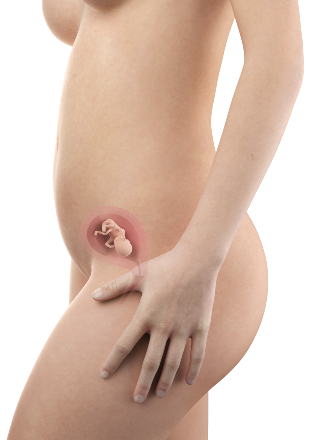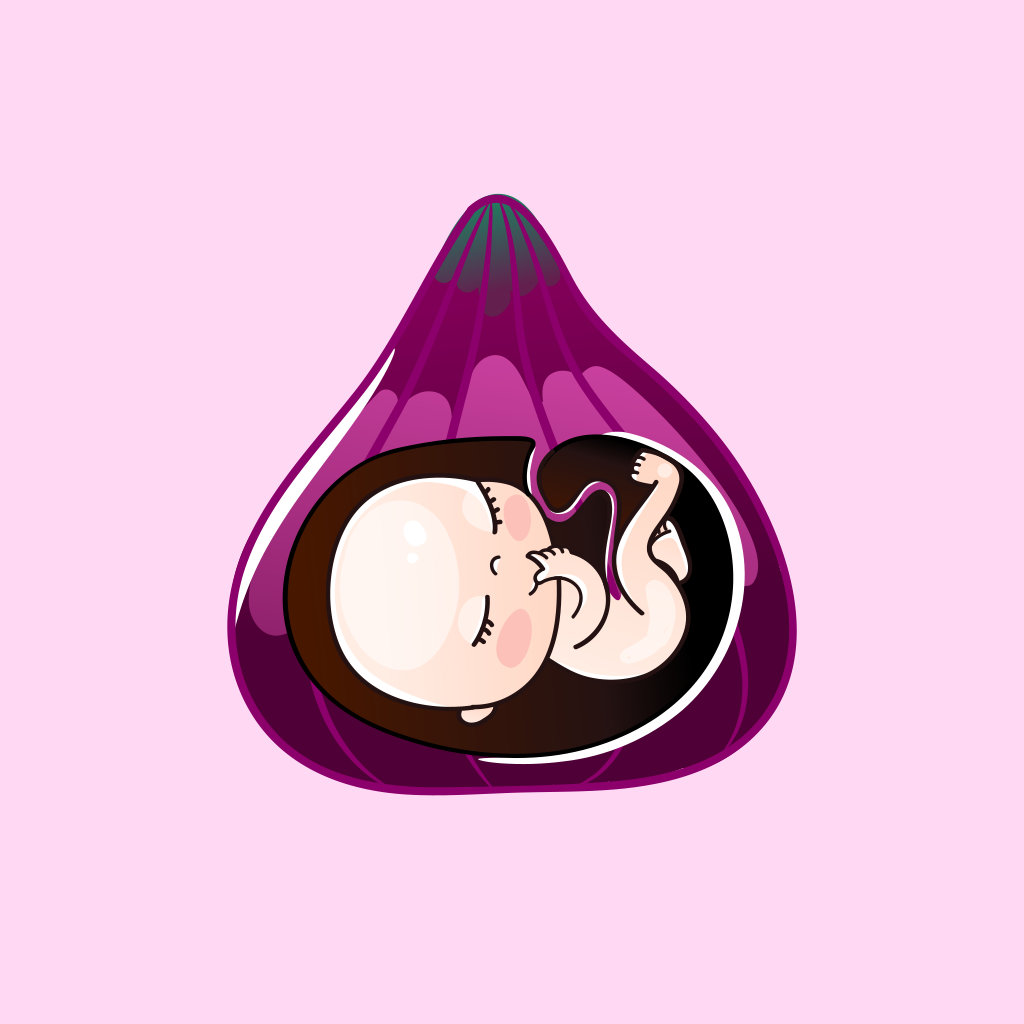This week, your pregnancy is just about to move into an exciting new chapter: the second trimester. You’ve already come so far, and your little one is growing and changing rapidly inside you, even if you can’t feel them quite yet. At 11 weeks, many early pregnancy symptoms may start to shift, giving you a first glimpse of the more energetic days ahead.
Your baby is now around the size of a fig. All the major organs and body systems are formed, and the rest of pregnancy will focus on growth and fine-tuning. Tiny fingers and toes are separated, and your baby can even make small movements, although it’s still too early for you to feel these gentle wiggles. Their little face is more recognizable now, with ears nearly in place and eyes moving closer together. It’s amazing what nature achieves in just a few short weeks.

Many moms-to-be notice changes in their own bodies by now. You might be experiencing less morning sickness (or it may hang on a bit longer), and possibly a little more energy. Some women notice their clothes feel snugger as their belly begins a gentle roundness, while others haven’t seen much of a bump yet—that’s perfectly normal. You could also see changes like shinier hair or stronger nails, thanks to those pregnancy hormones working in your favor.
As your uterus grows, you might need to go to the bathroom more often and could notice new veins across your breasts or legs. These changes are just your body’s way of supporting your growing baby and keeping both of you healthy. If you’re finding it hard to keep up with your regular routine, remember that fatigue is common at this stage, and resting when you can is always encouraged.
This week also marks a good time to think about prenatal screenings, if you haven’t already. Many women have their first ultrasound or hear their baby’s heartbeat for the first time around now, which is often an emotional and joyful milestone.
You’re almost at the end of the first trimester. Be gentle with yourself, celebrate your progress, and remember—each week brings you closer to meeting your little one.
Your Baby’s Development This Week
This week is a special one in your pregnancy—your little one is leaving the early days behind and growing more like a tiny newborn every day. At 11 weeks, your baby is officially considered a fetus, and while they’re still small (about the size of a fig or a lime), every part of their body is quickly becoming more complex and unique.
Here’s what’s happening inside your belly right now:
- The foundation for life: Your baby has been growing at a fast pace, and by this week, all the major organs are in place. Tiny bones are starting to harden, and muscle tissue is forming. This sets the stage for your baby to wiggle, stretch, and move (even if you can’t feel it just yet).
- A beating heart you can hear: The heart, now made up of all four chambers, is working hard and beating over 100 times per minute. If your provider listens with a Doppler device, you might get to hear that rapid “whoosh-whoosh”—a great sign that things are on track.
- New skills in motion: Your baby is learning to do more. This week, they start to swallow small amounts of amniotic fluid (the water-like fluid surrounding them) and practice “breathing,” moving their chest up and down in tiny motions that prepare them for life outside the womb.
- Forming their unique face: Facial features are taking shape. The head is still big compared to the body, but it’s looking more like a recognizable baby. The eyes—still widely spaced and covered by fused lids—won’t open for a while, but they’re clearly there. The ears are starting to rise up from the neck toward each side of the head.
- Tiny details appear: Fingernails have sprouted, and fingers and toes are now separated (no more webbing!). Tooth buds are forming beneath the gums, setting the stage for baby’s very first teeth long after birth.
- Inner workings: Red blood cells are now being produced in your baby’s liver, and the kidneys are working—producing urine that mixes with the amniotic fluid. The pancreas is also starting to make insulin, an important hormone for health.
- Beginning of gender differences: While you won’t be able to tell if you’re having a boy or girl yet, the outside structures are starting to develop. These will gradually become the penis or the clitoris and labia, but it’s too soon for ultrasound to show this detail.
It can feel surreal knowing how much is happening inside your body at such a tiny scale. Even though you can’t feel your baby move yet, rest assured there’s a flurry of activity going on! Every week brings new milestones and prepares your baby for a healthy and happy arrival. For now, take comfort knowing that your growing baby is right on track, developing their systems—and their sweet little features—one incredible week at a time.
Changes in the Mother’s Body
As you reach week 11 of your pregnancy, you might notice subtle but meaningful shifts in how you feel and look. Your body is working hard to nurture your growing baby, and lots of changes are happening, even if many are still hidden beneath the surface.
Here’s what many moms experience at this special stage:
- Your Belly and Body Shape: Your lower belly might begin to feel a little rounder or firmer. It’s different for every mom—some may see a small bump, while others might not see any changes yet. If this isn’t your first pregnancy, you may find you start to show a little earlier than you did before. Even if you don’t see much outward change, rest assured that your uterus is growing and your baby is getting bigger every day.
- Breast Changes: By week 11, many women notice their breasts are fuller or feel more sensitive than usual. Veins may become more noticeable, and your nipples and areolas might darken. Some moms find they need a more comfortable bra for extra support—the right fit can make a big difference in your daily comfort.
- Feeling Hungry (or Not): You may notice your appetite starting to pick up, especially if early nausea has started to fade. Eating small, balanced meals throughout the day can help manage hunger and keep your energy steady. If you still don’t feel like eating much, don’t worry—just do your best to nourish your body and baby with whatever foods you can tolerate right now.
- Lively Hair and Nails: Many moms are surprised to find their hair looks shinier and their nails grow quicker during pregnancy. Rising hormones can give you this “pregnancy glow,” though it’s not universal. If you experience it, enjoy the little extras!
- Headaches and Aches: It’s not uncommon to get more headaches, thanks to hormonal changes and increased blood flow. If you’re struggling, try to rest in a quiet, dark place when you can and keep hydrated. Always check with your healthcare provider before taking any medication, even something over-the-counter.
- Emotional Ups and Downs: There’s a lot happening in your body and mind, so feeling emotional, moody, or even a little weepy is entirely normal. Make time for yourself—read, take a walk, or chat with a friend. Remember, reaching out for emotional support is both healthy and encouraged.
- Skin Surprises: Your skin might change as well. Some women find their skin is oilier or drier than before, or they might notice dark patches (known as melasma) appearing. Using gentle skincare products and sunscreen can help protect your skin during this sensitive time.
Week 11 is all about adjusting to these early changes without putting pressure on yourself to feel or look a certain way. Every pregnancy is unique, so listen to your body and be kind to yourself. If anything seems unusual or troubling, never hesitate to check in with your healthcare provider—they want you and your baby to thrive every step of the way.
What Medical Checkups Are Needed at Week 11?
Reaching week 11 is an important milestone in your pregnancy, and it’s time for some key checkups to help keep both you and your baby healthy. These visits aren’t just about tests—they offer a chance to ask questions, get reassurance, and prepare for the exciting road ahead.
- Your Routine Prenatal Appointment: At this stage, you’ll usually have a regular prenatal visit. Your healthcare provider will check your blood pressure, weigh you, and talk about how you’ve been feeling. This is also a great time to share any symptoms you’re noticing—even small changes are worth mentioning!
- Listening to Baby’s Heartbeat: This week, your provider might use a small device called a Doppler to let you listen to your baby’s heartbeat for the very first time. Many moms say this is a magical and emotional moment. Don’t worry if it takes a minute to find—it’s normal for babies to hide!
- First Trimester Screening: Between weeks 11 and 14, your doctor may suggest a special screening. This usually involves:
- Nuchal Translucency Ultrasound: A gentle ultrasound looks at the back of your baby’s neck. This helps identify the chances of certain genetic conditions, like Down syndrome.
- Blood Tests: You may be given a quick blood test. These results, when combined with the ultrasound, give doctors more clues about your baby’s well-being.
This screening is optional, so feel free to discuss any questions or concerns with your provider before making your decision.
- Lab Work and Health Checks: Sometimes, your doctor will also check things like your iron levels, blood sugar, and test for infections. It’s all to make sure you stay as healthy as possible.
- What to Ask at Your Appointment: This is your time, too! Don’t hesitate to bring up anything on your mind. You might ask:
- Is it normal to still feel tired or nauseous?
- Are there foods or activities I should avoid this week?
- Should I be worried if I haven’t felt much of a bump yet?
- When is my next ultrasound?
Remember, these checkups are here to support you and your growing baby. Every mom and pregnancy is a little different, so what’s normal for one person might be unique for you. The most important thing is to keep an open line of communication with your healthcare team—and never be afraid to ask for extra support or clarification whenever you need it.
Nutritional Tips and Physical Exercise
At 11 weeks, your baby is growing quickly—so this is the perfect time to set healthy habits that nourish both of you. Thoughtful food choices and gentle movement can truly make a difference in how you feel each day, and help your little one thrive.
- Balance your plate. Try to include a mix of colorful vegetables, whole grains, lean proteins, and healthy fats at each meal. Choosing a variety of foods packs in important vitamins and minerals—for example, spinach and lentils give you folate and iron, while salmon and nuts provide healthy fats and protein.
- Choose snacks that count. When hunger strikes, reach for nutrient-rich snacks like Greek yogurt with berries, a small handful of almonds, sliced apple with peanut butter, or whole-grain crackers with cheese. These options give you lasting energy and extra nutrition.
- Stay hydrated. Water helps everything in your body run smoothly, from digestion to forming the amniotic fluid your baby floats in. Aim for at least 8 glasses a day, and carry a water bottle as a reminder. If plain water is tough to drink, try adding cucumber slices or a splash of lemon for flavor.
- Add more fiber. Pregnancy hormones can sometimes slow your digestion and cause constipation. Including fiber-packed foods like oatmeal, beans, berries, pears, or whole-wheat bread can help things move along comfortably.
- Be mindful of portions. Your appetite may be picking up, but you don’t need to “double” your calories. It’s more about wise choices than eating a lot more food—think of an extra sandwich, yogurt, or fruit each day to meet your growing needs.
- Don’t forget calcium. Your bones and your baby’s developing skeleton both need plenty of calcium. If milk is not your favorite, try options like fortified orange juice, cheese, leafy greens, or even a calcium-rich smoothie.
- Move your body gently. Staying active can boost your mood, help with sleep, and ease aches you might feel as your body changes. Activities like walking, prenatal yoga, and swimming are safe for most women—and you don’t have to do a lot. Even 15 to 20 minutes a day can be helpful. Listen to your body and stop if you feel dizzy, very tired, or have any pain.
- Stretch and breathe. Simple stretching and deep breathing exercises can relieve tension and support your changing posture. Take a few minutes each morning or evening to gently stretch your back, neck, and legs, and practice slow, calming breaths.
- Talk to your provider before changing routines. If you’re new to exercise or have questions about safe movement, check in with your healthcare provider. They can recommend activities that fit your health and pregnancy stage.
Remember, caring for yourself is the best way to care for your growing baby. Take it one day at a time and celebrate your efforts to eat well and stay active. You’re doing an amazing job!
Weekly Checklist
This week is a wonderful time to check in with your body and prepare for what’s to come.
Here are some helpful steps to guide you through Week 11:
- Schedule your first trimester screening: If it’s not already on your calendar, call your healthcare provider to set up your nuchal translucency ultrasound and recommended blood tests between weeks 11 and 14.
- Listen for your baby’s heartbeat: Ask your provider if you can hear your baby’s heartbeat at your appointment — it can be a comforting and exciting milestone.
- Start a healthy snacking routine: Keep nutritious snacks like fruit, yogurt, or nuts within reach to help manage hunger and energy dips during the day.
- Check your water intake: Try to drink several glasses of water daily, which can help reduce headaches and support your growing baby.
- Begin documenting your journey: Take a moment to snap a photo of your belly or jot down how you’re feeling; these memories will be special to look back on.
- Update your wardrobe: Consider picking up a few items of loose or stretchy clothing if you’ve noticed your body changing — comfort is key right now.
- Gently move your body: If you feel up to it, enjoy light walks or gentle stretching to boost your mood and reduce stress (always check with your healthcare provider before starting something new).
- Look out for easing symptoms: If your morning sickness is letting up, celebrate this small victory and try new foods that might appeal to your changing appetite.
- Talk to your provider about headache relief: If you’re experiencing frequent headaches, ask for safe strategies or remedies that are suitable during pregnancy.
- Start planning ahead: If you’d like a short getaway, begin thinking about a relaxing “babymoon” for the second trimester when most moms have a bit more energy.
Each small step brings you closer to meeting your little one. Always reach out to your healthcare team with any worries — they’re there to support you every step of the way. You’re doing an amazing job!
When to Call Your Doctor
Most pregnancies progress smoothly, but it’s important to know which symptoms need a closer look. Even if something seems small, your comfort and peace of mind matter.
Here are signs you should reach out to your healthcare provider during week 11:
- Heavy Bleeding: If you notice bleeding that soaks a pad in an hour (or more), or you see large clots, don’t wait—call your doctor right away.
- Severe Cramps or Pain: Any strong or sharp pain in your lower belly, especially if it’s not going away with rest, deserves prompt attention.
- Fever: A temperature above 100.4°F (38°C) could signal an infection. Don’t try to wait it out; let your care team know.
- Chills or Feeling Very Unwell: If you feel weak, shaky, or just “off” in a way that worries you, trust your instincts and call.
- Pain or Burning When You Pee: Discomfort or blood when urinating can be a sign of a urinary tract infection, which needs quick treatment in pregnancy.
- Sudden Swelling: Noticeable puffiness in your hands, feet, or face—especially if it comes on quickly—should be reported, even this early in pregnancy.
- Bad Headaches or Vision Changes: Intense headaches that won’t go away with rest, or if you see flashing lights, spots, or have trouble seeing, get in touch for guidance.
- Severe Nausea: If you can’t keep any food or liquids down for more than 24 hours, or you feel dizzy or faint, your doctor can help you avoid dehydration.
- No Pregnancy Symptoms at All: If your morning sickness, breast tenderness, or other early pregnancy symptoms suddenly disappear, and you feel concerned, don’t hesitate to check in.
- Unusual Vaginal Discharge: Any discharge that is green, yellow, foul-smelling, or accompanied by itching or pain should be shared with your provider.
- Feeling Less Connected: If you’re struggling with your emotions, feeling overwhelmed, or experiencing ongoing sadness, reaching out is always the right step. Your mental health matters, too.
Remember, every pregnancy is unique—and you know your body best. If something doesn’t feel right, or even if you just have a question that’s keeping you up at night, your healthcare team is there to support you. Don’t ever worry about “bothering” them; your well-being is always worth the call.
Preparations for Baby
As you reach week 11, the idea of meeting your little one might still feel far off, but now is a great time to take small, meaningful steps to prepare both your heart and home. You don’t need to do everything at once—just making gentle progress can help you feel more ready and excited for what’s ahead.
- Start Dreaming About Your Nursery: You don’t need to buy anything just yet, but now is a fun time to think about where your baby will sleep. Browse ideas for cozy setups, color palettes, and simple touches that make you smile. Even picking a soft nightlight or imagining a rocking chair for cuddles can make things feel more real.
- Gather Important Info: Create a simple folder—either on your phone or in a notebook—to store questions, tips, or resources you come across. Jot down advice you receive and ideas you want to remember for later, like baby names, pediatricians to call, or things you want to research further.
- Connect With Your Support System: Whether it’s your partner, a friend, or a family member, share your thoughts and feelings about pregnancy. Let others help with practical things, like picking up groceries or giving you a ride to appointments. Building your circle now helps for later, too.
- Make a Simple To-Do List: Tackling everything at once is overwhelming, so jot down “little jobs” like clearing a dresser drawer, making some extra freezer meals, or looking up maternity leave policies through work. Checking off one or two each week keeps things manageable.
- Practice Self-Care Routines: Small acts, like moisturizing your growing belly, doing gentle stretches, or keeping a water bottle handy, make a big difference. Treat these moments as special ways to connect with your baby and care for yourself.
- Talk to Baby: It might feel silly at first, but try speaking or reading softly to your belly. This not only helps you bond, but studies show babies can sense and respond to your voice before they’re born!
- Create a Calm Spot at Home: Set aside a relaxing place with a favorite blanket or chair where you can unwind, reflect, or simply put up your feet. Having a comforting spot can offer a daily reminder that you and your baby deserve moments of rest and peace.
Remember, preparing for baby is less about having everything done perfectly, and more about making small choices that help you feel confident and cared for. Every little step you take brings you closer to meeting your baby, and you’re doing a wonderful job already.
Citations and References
- The American College of Obstetricians and Gynecologists (ACOG) – Details on fetal development, routine screening, and common symptoms during the first trimester. Visit Source
- Mayo Clinic – Information on baby’s physical changes, maternal symptoms, nutrition, and prenatal visits for Week 11. Visit Source
- Cleveland Clinic – Overview of fetal milestones, first trimester screening, and symptom management at 11 weeks. Visit Source
- Centers for Disease Control and Prevention (CDC) – Recommendations for caffeine intake, prenatal care, and healthy pregnancy behaviors. Visit Source
- National Institutes of Health (NIH) – Further details on typical prenatal tests and screening options between weeks 11–14. Visit Source
- World Health Organization (WHO) – Global recommendations on maternal nutrition and antenatal care practices in the first trimester. Visit Source










